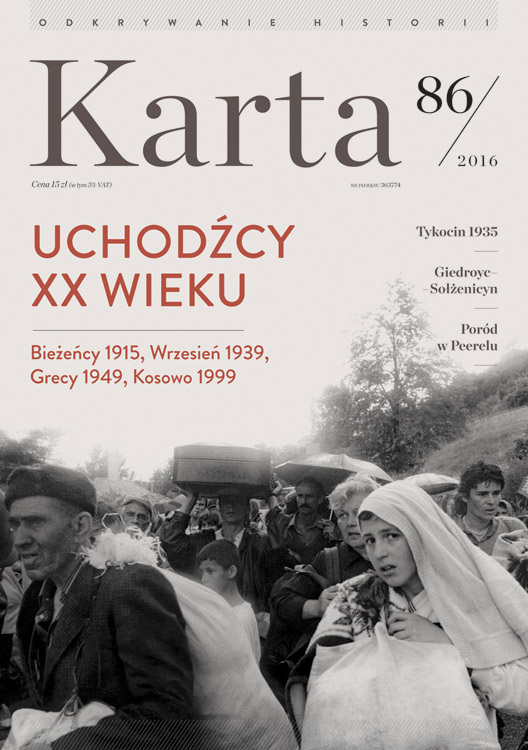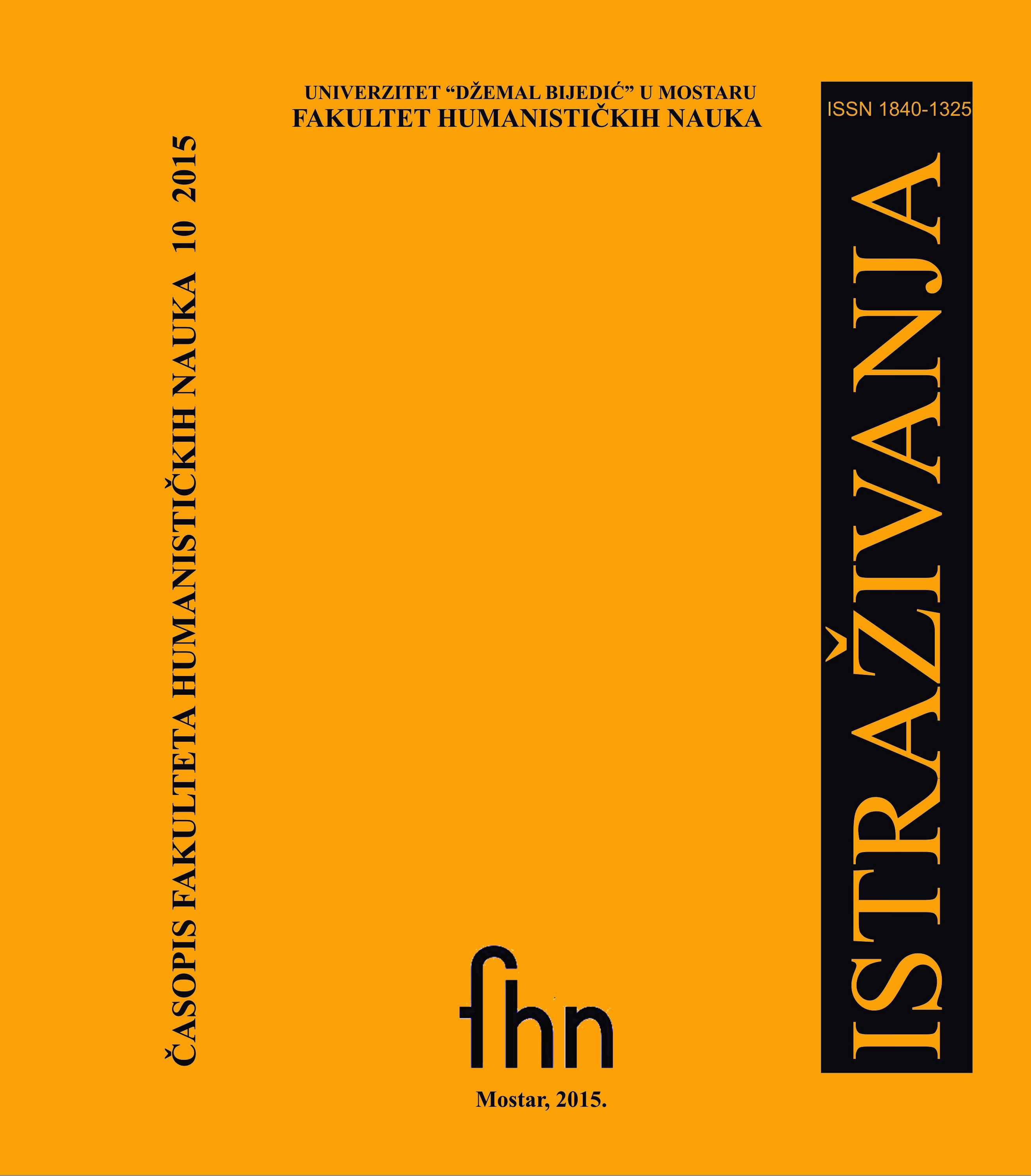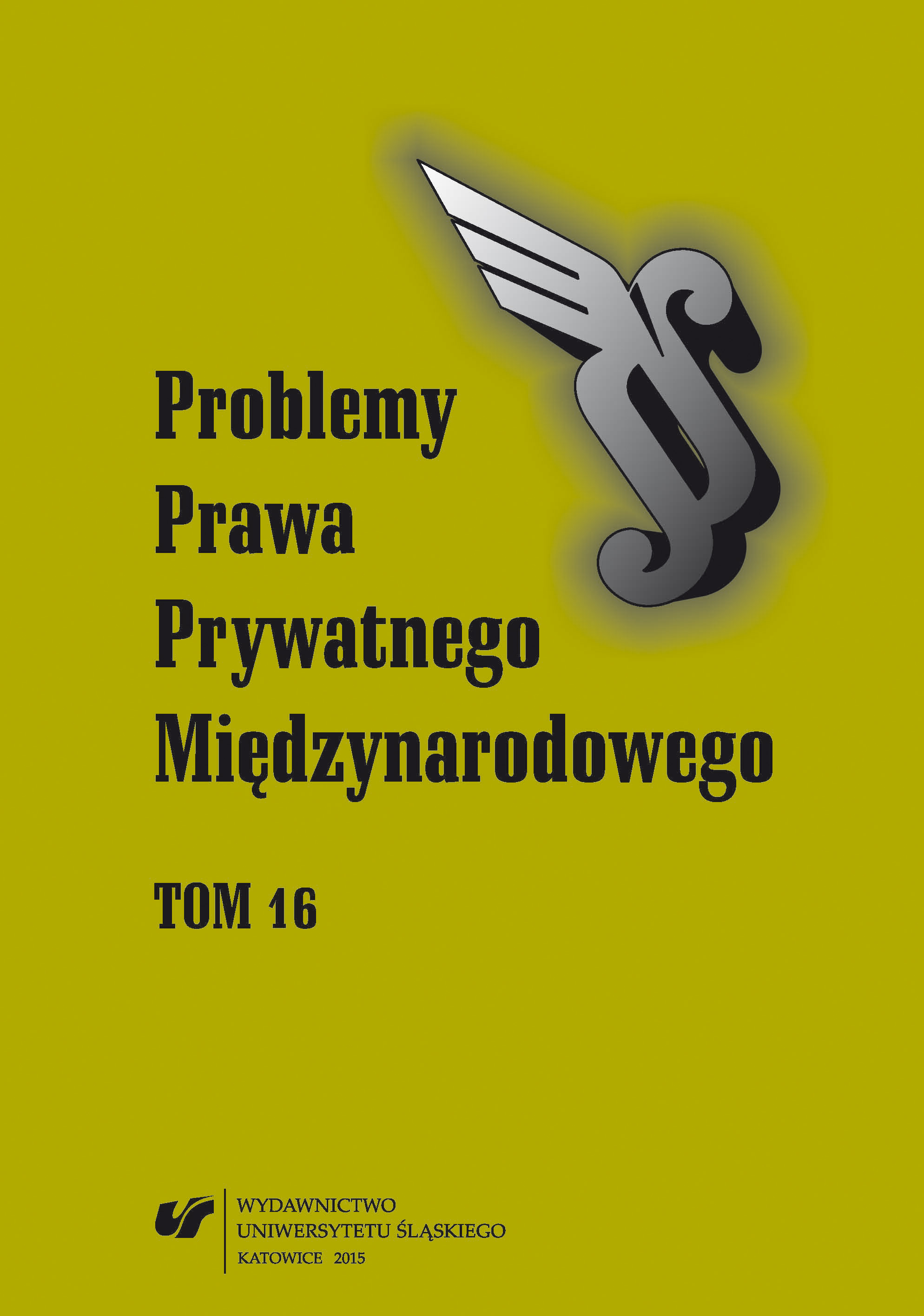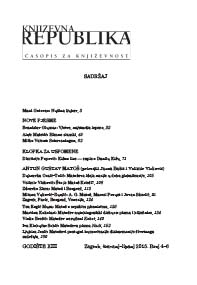


Keywords: Grecy w Polsce; Macedończycy; uchodźcy; Greeks; Macedonians;refugees;
Polska przełomu lat 40./50. nie wydaje się "ziemią obiecaną". Jednak kilkunastu tysiącom Greków i Macedończyków, uciekających przed skutkami wojny domowej we własnym kraju - jawi się jako miejsce bezpieczne i zasobne.
More...
Keywords: anthroponyms; structure; folk songs; Tešanj area;
This paper analyzes the structural characteristics of male and female names confirmed in the manuscript collection of folk songs that were recorded in Tešanj area. Structural features of names are compared with the situation in the today's language.
More...
Keywords: seat of company; refugee; state succesion; company
The aim of this paper is to explore the issues arising out of so called “compulsory transfer of the registered office of the company”. The judgment of Polish Supreme Court dated 12 March, 2015 (I CSK 452/14) relates to the contemporary legal status of Polish company incorporated before the Second World War in Lemberg but still leaves many questions unanswered. The Author seeks to find the solution to the problem of the effects of a succession of States after the incorporation of the company with the use of different instruments of private international law. Observations based on the jurisprudence of American, German and French courts highlight the right to transfer the company, which has its registered office after the succession on the territory of the succesor state, to the state which law previously governed the creation of the company.
More...
Keywords: content of foreign law; impossibility to ascertain foreign law; obligation of the court; reasonable time; Polish law as last resort
The article focuses on problems with the determination of foreign law. According to Polish regulations, the court is obliged to ascertain the content of the applicable law of its own motion. However, obstacles might be encountered in the process, which effectively hinder the procedure. The author discusses the question whether the provision of Art. 10 S. 2 of the 2011 Act on Private International Law is a functional solution, especially as regards the statutory criterium of “reasonable time”. Namely, the court’s efforts to determine the content of the law applicable should be undertaken within a time limit deemed as “reasonable”, given the facts of the case and the need to resolve it in an effective way. The court is obliged to undertake all available measures to ascertain the content of applicable law, having in mind that it cannot lead to a situation where the parties’ interests would be frustrated by the process taking too long. Should the court find that the determination of foreign law is not possible within reasonable time, according to Art. 10 s. 2 of the Act cited above it is obliged to apply Polish law as a last resort. In the article it is analyzed whether the present statutory regulation fulfills its role, as expected in the law-making process. The author concludes that this provision is a flexible solution, allowing the court to assess the situation in a given case and reach a decision taking into account all the important issues. There is no need modify the law, especially by introducing a more detailed provision.
More...
Matoševe bilježnice i pisma, dominantno obilježeni, kao uostalom i gotovo sva njegova fikcionalna i nefikcionalna djela, autobiografskim diskursom, među najmanje su proučavanim segmentima njegova stvaralaštva. Dvadeset je sačuvanih bilježnica na više od tisuću i petsto rukopisnih nepaginiranih stranica2 te više od šesto poznatih nam pisama, dopisnica i razglednica,3 koje je najčešće slao iz Beograda, Pariza i Ženeve, »iscrpan dokument o širokim prostranstvima njegovih interesa kao i pouzdan vodič kroz njegovo stvaralaštvo i život«. (Kapetanić, 1976: 353)
More...
Keywords: Rome II Regulation; non-contractual obligations; consultations regarding the practical application; Commission’s Questionnaire
Regulation (EC) No 864/2007 of the European Parliament and of the Council of 11 July 2007 on the law applicable to non-contractual obligations (the Rome II Regulation) defines the conflict-of-law rules applicable to non-contractual obligations in civil and commercial matters. It has been in force since 11 January 2009. Article 30 of the Regulation foresees an evaluation report on its application. The European Commission already asked the Polish Ministry of Justice for an input via a Questionnaire issued in 2012 (see M. Pazdan, M. Jagielska, W. Kurowski, M. Świerczyński, M.-A. Zachariasiewicz, M. Zachariasiewicz, Ł. Żarnowiec: “Materials: The Response to Commission’s Questionnaire to the Member States Regarding the Application of the Regulation 864/2007 on the Law”. „Problemy Prawa Prywatnego Międzynarodowego” 2013, vol. 12, p. 165—197). At that stage — it was not yet possible to present a developed picture of our courts’ approach to the Regulation as no extensive case-law was available in Poland. With the new Questionnaire dated June 2015 the Commission-Directorate A: Civil Justice asked the Polish Ministry of Justice for new information and insights on the application of the Rome II Regulation in Poland that have been gathered in the meantime. Similarly to the original response to the Commission’s Questionnaire, this supplement was prepared jointly, by a group of authors under a lead of professor Maksymilian Pazdan. The supplement constituted the basis for the reply given to the Commission by the Polish Codification Committee on behalf of the Polish government. Since the preparation of the original response time has passed and experience has accrued. Accordingly, a number of issues concerning the application of the Regulation have surfaced. The new opinion brings additional information on Polish case law to the attention of the Commission. The authors are of the of the view that the reason why the Regulation has been finally noticed by Polish courts may be the reference to this act included in Art. 33 of Polish Private International Law. Jurisprudential analysis presented in this supplement indicates that Polish courts face many difficulties when applying the Rome II Regulation. These concern, among others, the scope of the Regulation itself, as well are of its particular provisions, the demarcation of the Regulation and the Hague Convention of 1971, the interpretation of the criterion of a„manifestly closer connection” and the criterion of a „close connection of a tort with an earlier contract”, the determination of the place of damage and admissibility of the application of Arts. 16 and 17 of the Rome II Regulation. Unfortunately there are cases when the Regulation was ignored by Polish courts. The authors of the supplement propose a number of possible amendments to the Regulation, including changes to conflict rules for traffic accidents, the protection of privacy and other personal rights, intellectual property, unfair competition and the protection of third party rights.
More...
Prijelaz iz 19. u 20. stoljeće za Antuna Gustava Matoša (1874. — 1914.) prošao je u bježanju od vojne obveze i četrnaest godina emigracije — prvo u Srbiji, koja mu je pružila »prvo utočište«, a nakon kraćeg zadržavanja u Beču, Münchenu i Ženevi, u Parizu, na Zapadu, za kojim je »žudio i odavna čekao«, pa »da budem bliže Zagrebu, po drugi put u Beograd 1904.« otkuda potajno navraća u Zagreb — i tako sve do amnestije 1908. kada se napokon vraća u domovinu.
More...
Sarajevska Nada, »ilustrovani časopis za pouku, zabavu i umjetnost«, bila je jedan od najvažnijih književnih časopisa koji su u vrijeme moderne izlazili izvan Zagreba. Pod vodstvom Koste Hörmanna, glavnoga i odgovornog urednika, i kulturno–književnoga urednika Silvija Strahimira Kranjčevića, izdavala ju je od 1895. do 1903.1 Zemaljska vlada Bosne i Hercegovine s ciljem da, po zamisli njezina duhovnog tvorca Benjamina Kállaya, »suzbije utjecaj hrvatskih i srpskih književnih glasila, da afirmira austrougarsku kulturnu politiku u Bosni i Hercegovini i da kvalitetom svojih priloga i grafičke opreme privuče što veći broj čitalaca«.
More...
Keywords: Warsaw; II World War; WWII; occupation
Dziennik oficera rezerwy
More...
Što preostaje literatu ako se uzda u smijeh kao moćno sredstvo praštanja želeći tematizirati karakterne fizionomije izvanknjiževne zbilje, u kojoj se mane češće očituju nego vrline, deformacije nego nadogradnje, plošnost nego finese? Ako se uzme u obzir Matošev humoreskni opus, odgovor na to pitanje krije se u neobičnom spoju fikcionalizacije »tipova čovječanstva«, pri čemu se istinitost sadržaja iz područja realnoga humornim preoblikovanjem pretače iz svoje proturječnosti i suprotnosti da bi, naposljetku, fikcija potvrdila fakciju: Matoševi humoreskni protagonisti većinom su utjelovitelji onih osobina s kojima se autor često obračunavao u svojem polemičkom i publicističkom diskursu.
More...
Na Jacquesa Le Goffa i njegovo obrazloženje ideje o dva dorečenija kršćansko–antropološka koncepta razumijevanja čovjeka upozorit će Dean Duda u »Kulturi putovanja«. Prvi koncept je onaj putnika, a drugi pokajnika. Putnik ima bitan značenjski i simbolički višak. On je homo viator, čovjek u hodu, onaj koji se kreće, uvijek u dvostruko artikuliranom prostornom i vremenskom prolasku — na zemaljskom putu i na putu vlastitog života.
More...
Keywords: separation of property; French ordinance authorizing the spouses to live separately; judgment on legal separation; law applicable to the patrimonial effects of marriage; terms equivalence evaluation
According to the main theses arising out of the statement of reasons of the Supreme Court Judgement of 28th May, 2014, I CSK 330/13: 1. The separation of property as provided in art. 54 § 1 of Polish Family and Guardianship Code (PFGC) may result from a foreign court order, if this order corresponds to the judgment on legal separation as known in the Polish law. 2. The ordinance of the French court authorizing the spouses to live separately, issued as part of divorce proceedings cannot be qualified as the equivalent of the judgment on legal separation known to the Polish law. Both theses should be approved. However, the first one must be supplemented with the fact that the effect provided in art. 54 § 1 PFGC may only be attributed to a foreign judgement, when the law applicable to the patrimonial effects of marriage in the moment of such judgement is the Polish one. Furthermore, the above mentioned effect can occur as a consequence of a foreign judgment only if this judgment is recognised in Poland. In order to check whether the foreign judgment concerned in casu corresponds to the Polish judgment on legal separation, the terms equivalence evaluation must be carried out. In the case concerned, it was necessary to carry out such an evaluation with reference to the French ordinance authorizing the spouses to live separately [“l’ordonnance de résidence séparée”]. In the absence of sufficient similarity between the analysed ordinance and the Polish judgment on legal separation, the provision of art. 54 § 1 PFGC cannot apply with regard to the former. Therefore, in spite of some objections to the reasoning of the Supreme Court, we should agree with the final settlement made in the case.
More...
I stoljeće nakon autorove smrti Matoševa poezija ima izazovnosti i poticajnosti, nudi nam niz iznimno sretno usklađenih slika i strofa, dobro ugođenih zvukova i znakova, a istodobno dovodi u pitanje ideju oblikovnog savršenstva potrebom, čak nuždom, prevršavanja ustaljenih kriterija i standardiziranih normi. Naš najizrazitiji lirski artist i nadahnuti artifeks istančanih stihova, cizeliranih po najstrožim mjerilima parnasovske škole, bodlerovske sinestezije, poovske konstrukcije, kranjčevićevske tradicije, ujedno je i prvi tvorac antiestetičkih, verbalno drastičnih, egzistencijalno–ekspresionistički intoniranih i u našim razmjerima protoavangardističkih poetskih nastojanja, pokušaja i ostvarenja.
More...
Keywords: "Kultura"; listy;letter correspondence;Russia (Soviet Union);Rosja;
Polowa lat 70. Jerzy Giedroyc namawia Aleksandra Sołżenicyna, wydalonego właśnie z Sowietów, na mocny głos w sprawach polsko-rosyjskich. Pisarz odmawia.
More...
Keywords: PRL; porody; fotoreportaż;hospitals; szpitale;
Kobiety o doświadczeniu szpitalnego porodu w połowie lat 80.
More...
Keywords: Podlasie;1941;Jews;
Kontynuacja dyskusji, podjętej w "Karcie" 85, wokół zeznań Polaków, którzy latem 1941 mordowali żydowskich sąsiadów na Podlasiu.
More...


Miroslav Krleža: Bela, dijete drago. Pisma. Priredio i protumačio Vlaho Bogišić. Zagreb, Naklada Ljevak, 2015. Branka Kijuk: Kiša u srcu. Stajergraf, Biblioteka »Poezija«, Zagreb, 2013. Branislav Glumac: Soba kao zavičaj — Žileti za preživljavanje. V.B.Z., Zagreb, 2015. Branislav Glumac: Cjediljka za perfekt: autobiografija. Profil, Zagreb, 2014. Željka Živković: Esekerski capriccio.Edicije Božičević, 2013, Zagreb
More...